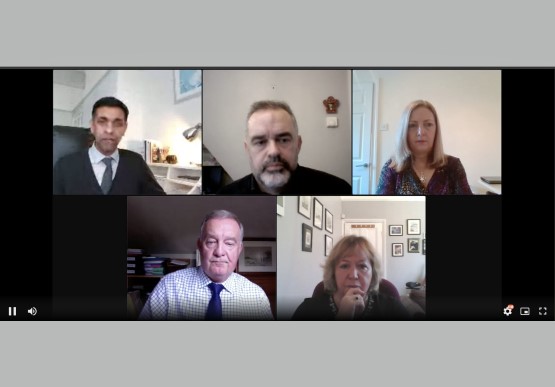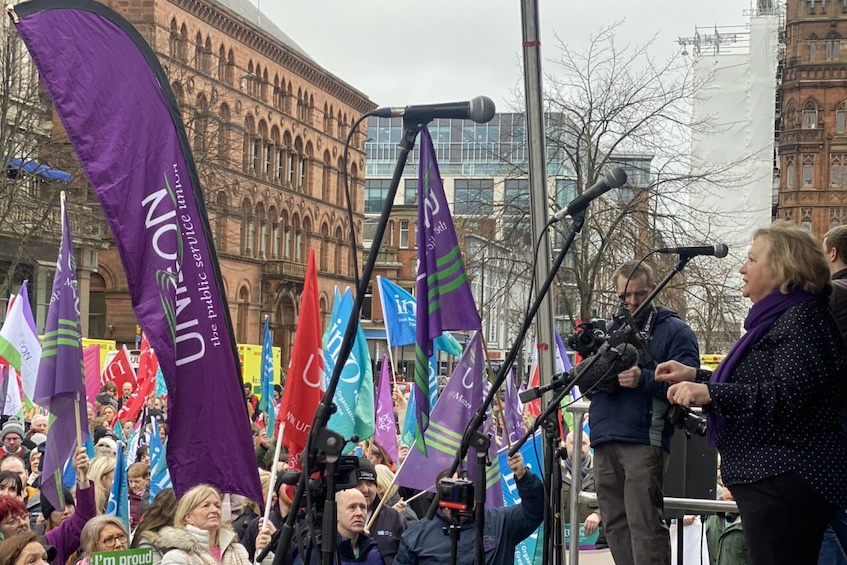MiP Summit: “Disruptive transformation” of NHS could last for years

The COVID-19 pandemic has unleashed “phenomenal and disruptive transformation” in everyday life and changes in the NHS that could last for many years, MiP chief executive Jon Restell told delegates at the opening session of the union’s virtual Summit on 2 November.
Due to the COVID-19 pandemic, this year’s annual gathering of MiP members takes the form of 90-minute virtual meetings spread over the week. Monday’s first session featured a panel discussion on the “new normal” in the NHS and its implications for managers.
Chairing the discussion, Restell said the pandemic had “laid bare” the inequalities endured by BAME staff and patients, and “brutally exposed” the failings in social care. The NHS had “performed brilliantly in the most difficult circumstances when there was no road map to follow,” he said, but warned that managers – now facing the second wave alongside winter pressures and in many cases without being able to take a proper break – were now under working under extreme pressure under conditions of great uncertainty.
The widespread and rapid adoption of new digital technology and homeworking has posed difficult issues for managers, Restell said. He pointed to the results of a poll of delegates, taken during the discussion, which found that 20% per cent felt they did not have adequate IT equipment to do their job effectively.
Rethinking homeworking
Rebecca Smith, managing director of NHS Employers, agreed. “Not everyone is well set up for homeworking, with adequate space and equipment,” she said. “I feel some people really embrace home working and others find it more of a challenge. We need to think about different levels of support for people.”
People also felt fatigued from continuous virtual meetings and having to be “always available” – especially outside normal working hours and at weekends, Smith warned. Protecting people’s health and wellbeing was becoming ever more important, she said, as many people were likely to continue working from home for at least some of the time. She said employers needed to revisit their arrangements for homeworking to ensure people felt supported in the longer-term.
Short memories
Looking further ahead, UNISON assistant general secretary Christina McAnea raised concerns about NHS funding in the post-pandemic era. The government could “come after” the public sector, she warned, and this might include looking to reduce public sector pay and pensions. There were already moves towards redundancies in local authorities, she said, and she did not expect the NHS to be immune from these pressures after the pandemic. “People have short memories… There has been a recognition that we have to work together to get through this. It would be good to keep this going as we move forward,” she said.
She stressed the importance of implementing a proper workforce strategy across the NHS and especially social care, where many staff had been working under “enormous pressure” in very low-paid jobs. “You can’t do anything until you get the workforce right,” she said.
Learning lessons
Looking ahead to the likely inquiry into the handling of the pandemic, David Cain, chair of MiP’s National Committee, warned that managers could be made to carry the blame. This had already started to some extent, he said, with the debates about the shortages of Personal Protective Equipment (PPE) and lack of hospital capacity during the first wave. “We have to be pretty careful as a union that we protect managers against unnecessary criticism,” he said.
He called for the debate to focus on learning lessons rather than apportioning blame. “In the NHS, social care and local and central government, we will all need to work together to get through this dark winter ahead of us,” he said. “We will have to call on our professional and personal reserves like never before.”
Equality ‘went out the window’
Dr Habib Naqvi, director of the newly-founded NHS Race and Health Observatory, linked the under-representation of BAME people at the top levels of the NHS to the health inequalities exposed by the pandemic. “A change of culture is vital,” he said, pointing out that over half of new staff joining the NHS last year were from a BAME background.
“One of the big challenges for me was to see how quickly equality, diversity and inclusion went out of the window as soon as we started working away from the norm in an emergency situation,” he added. “The crucial element of the observatory is its independence. I think we now need to move away from the NHS setting its own exam paper and marking it on this critical agenda.”
Restell added that the omission of a crucial chapter on the impact of the virus on BAME people from Public Health England’s initial report on the crisis had been “electric”, and threatened to undermine the confidence of BAME communities in the health and social care system.
|
MiP has welcomed moves to speed up pay progression for Band 8 and 9 managers and tackle long-standing problems with the Agenda for Change pay system that deter staff from seeking promotion.
23 September 2024
| By MiP
News
|
|||||
|
MiP has welcomed a 5% pay rise for very senior and executive senior managers in the NHS in England, after the UK government accepted the latest recommendations from the Senior Salaries Review Body (SSRB).
09 September 2024
| By MiP
News
|
|||||
|
MiP has welcomed the 5.5% pay rise for NHS staff on Agenda for Change as “a notable shift” and a “good starting point” for future negotiations.
04 September 2024
| By MiP
News
|
|||||
|
The health secretary’s plans to cut 5,500 management jobs to fund community services if the Conservatives win the general election have been criticised as “not credible” by Labour and “paper thin” by MiP.
25 June 2024
| By MiP
News
|
|||||
|
After months of industrial action, NHS workers in Northern Ireland have accepted a 5% pay offer for last year negotiated by health unions and the Department of Health.
05 April 2024
| By MiP
News
|
|||||
|
NHS leaders must show how they are driving service improvement, delivering transformation, promoting equality and developing a just culture as part of new “competency framework” for directors introduced by NHS England this month.
04 April 2024
| By MiP
News
|
|||||
|
Three-quarters of MiP members say NHS England’s new hybrid working policy is more likely to damage productivity than improve it, according to a recent survey. Half say there isn’t enough office space for staff to return to the office.
03 April 2024
| By MiP
News
|
|||||
|
The latest NHS Staff Survey showed a modest improvement in staff morale, but found NHS workers were facing record levels of discrimination, and a significant proportion still plan to leave their jobs in the near future.
20 March 2024
| By MiP
News
|
|||||
|
Related News
-

MiP responds to the abolition of NHS England
Government risk repeating same mistakes as Lansley by abolishing NHS England and cutting more staff from ICBs, says MiP.
-

NHS England and central staff could be cut by 50%, NHSE has announced
Government planned cuts at NHS England go much further than previously announced, with up to 50% of staff at risk.
-

New MiP survey shows growing support for principle of regulating managers, but warns it won’t improve patient safety
MiP’s member survey on regulating NHS managers shows managers are still not convinced regulation will improve patient safety or raise standards, despite growing support for it in principle.







